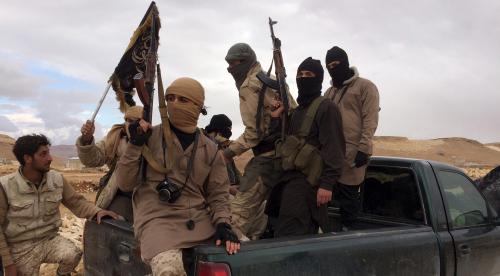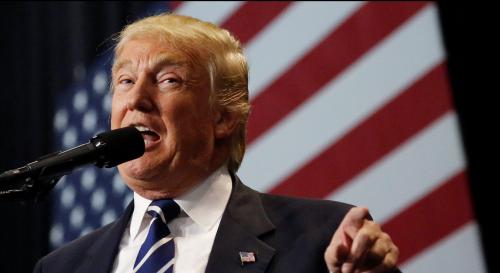Last night, retired lieutenant general Michael Flynn addressed the Republican convention as a headline speaker on the subject of national security. One of Donald Trump’s closest advisors—so much so that he was considered for vice president—Flynn repeated many of the themes found in his new book, The Field of Fight, How We Can Win the Global War Against Radical Islam and Its Allies, which he coauthored with Michael Ledeen. (The book is published by St. Martin’s, which also published mine.)
Written in Flynn’s voice, the book advances two related arguments: First, the U.S. government does not know enough about its enemies because it does not collect enough intelligence, and it refuses to take ideological motivations seriously. Second, our enemies are collaborating in an “international alliance of evil countries and movements that is working to destroy” the United States despite their ideological differences.
Readers will immediately notice a tension between the two ideas. “On the surface,” Flynn admits, “it seems incoherent.” He asks:
“How can a Communist regime like North Korea embrace a radical Islamist regime like Iran? What about Russia’s Vladimir Putin? He is certainly no jihadi; indeed, Russia has a good deal to fear from radical Islamist groups.”
Flynn spends much of the book resolving the contradiction and proving that America’s enemies—North Korea, China, Russia, Iran, Syria, Cuba, Bolivia, Venezuela, Nicaragua, al-Qaida, Hezbollah, and ISIS—are in fact working in concert.
No one who has read classified intelligence or studied international relations will balk at the idea that unlikely friendships are formed against a common enemy. As Flynn observes, the revolutionary Shiite government in Tehran cooperates with nationalist Russia and communist North Korea; it has also turned a blind eye (at the very least) to al-Qaida’s Sunni operatives in Iran and used them bargaining chips when negotiating with Osama bin Laden and the United States.
Flynn argues that this is more than “an alliance of convenience.” Rather, the United States’ enemies share “a contempt for democracy and an agreement—by all the members of the enemy alliance—that dictatorship is a superior way to run a country, an empire, or a caliphate.” Their shared goals of maximizing dictatorship and minimizing U.S. interference override their substantial ideological differences. Consequently, the U.S. government must work to destroy the alliance by “removing the sickening chokehold of tyranny, dictatorships, and Radical Islamist regimes.” Its failure to do so over the past decades gravely imperils the United States, he contends.
The book thus offers two very different views of how to exercise American power abroad: spread democracies or stand with friendly strongmen…[P]erhaps it mirrors the confusion in the Republican establishment over the direction of conservative foreign policy.
Some of Flynn’s evidence for the alliance diverts into the conspiratorial—I’ve seen nothing credible to back up his assertion that the Iranians were behind the 1979 takeover of the Grand Mosque in Mecca by Sunni apocalypticists. And there’s an important difference between the territorially-bounded ambitions of Iran, Russia, and North Korea, on the one hand, and ISIS’s desire to conquer the world on the other; the former makes alliances of convenience easier than the latter. Still, Flynn would basically be a neocon if he stuck with his core argument: tyrannies of all stripes are arrayed against the United States so the United States should destroy them.
But some tyrannies are less worthy of destruction than others. In fact, Flynn argues there’s a category of despot that should be excluded from his principle, the “friendly tyrants” like President Abdel-Fatah el-Sissi in Egypt and former president Zine Ben Ali in Tunisia. Saddam Hussein should not have been toppled, Flynn argues, and even Russia could become an “ideal partner for fighting Radical Islam” if only it would come to its senses about the threat of “Radical Islam.” Taken alone, these arguments would make Flynn realist, not a neocon.
The book thus offers two very different views of how to exercise American power abroad: spread democracies or stand with friendly strongmen. Neither is a sure path to security. Spreading democracy through the wrong means can bring to power regimes that are even more hostile and authoritarian; standing with strongmen risks the same. Absent some principle higher than just democracy or security for their own sakes, the reader is unable to decide between Flynn’s contradictory perspectives and judge when their benefits are worth the risks.
It’s strange to find a book about strategy so at odds with itself. Perhaps the dissonance is due to the co-authors’ divergent views (Ledeen is a neocon and Flynn is comfortable dining with Putin.) Or perhaps it mirrors the confusion in the Republican establishment over the direction of conservative foreign policy. Whatever the case, the muddled argument offered in The Field of Fight demonstrates how hard it is to overcome ideological differences to ally against a common foe, regardless of whether that alliance is one of convenience or conviction.





Commentary
Realist or neocon? Mixed messages in Trump advisor’s foreign policy vision
July 19, 2016